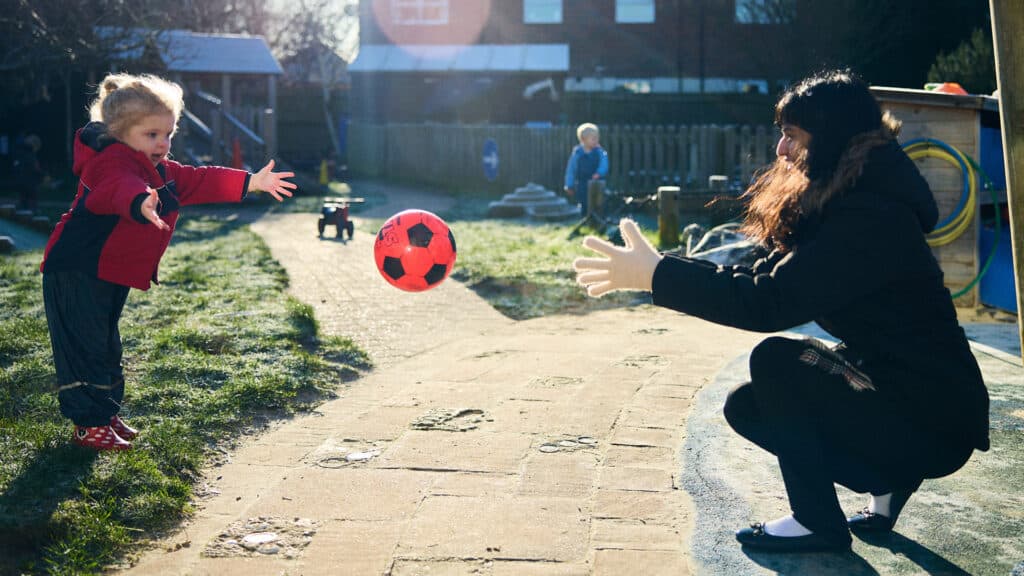10th
in the UK for student satisfaction
Complete University Guide 2023
95%
positivity that the course has developed your knowledge for the future
National Student Survey 2024
Top 10
for learning opportunities
National Student Survey 2024
Join us at one of our Open Days!
Saturday 11 October
Sunday 26 October
Saturday 22 November
Saturday 11 October
Sunday 26 October
Saturday 22 November
Our next Open Day is in:
Overview
Develop both your understanding of children and your therapeutic skills
Our BA (Hons) Childhood with Therapeutic Play encompasses working with children in a variety of settings and contexts with a focus on utilising therapeutic play approaches.
National Student Survey 2023
Overall average positivity
Organisation and management
Learning resources
Develop your knowledge and skills
This programme is the perfect preparation to work therapeutically with children and young people in specialist SEND settings, to support children with social, emotional and mental health challenges in mainstream settings, or to undertake further training to become a registered Play Therapist.
Choose your pathway
This unique and innovative course will offer two distinct pathways:
- ‘Early Childhood’ working with children aged 0-8 years of age which confers Level 3 ‘full and relevant’ status,
- or ‘Childhood’, which provides the option to work with children and young people across the age range.
Routes for all
We also offer an Integrated Foundation Year option for those looking to develop their academic confidence and skills before beginning a full degree.
On this course you will:
- Investigate, understand and analyse the fast-changing landscape of working with children.
- Develop your understanding of and skills in utilising therapeutic play approaches.
- Pursue specific pathways that allow you to centre your learning around your passions and interests.
- Gain practical experience in real-world environments.
The Course
Develop your practice skills and knowledge of working with children
The course provides the opportunity to gain professional practice experience making clear links between theory and therapeutic practice.
You will be guided through an exciting range of modules that are specifically designed to increase understanding of children, and to develop therapeutic skills.
Study areas include:
- Children's Health and Wellbeing
- Special Educational Needs
- Play, Creative and Expressive Arts
- Therapeutic Play
- Working Therapeutically with Families
- Being Human.
This list is indicative and subject to change.
Final research project
Students in their third year will undertake an independent research project with a therapeutic play focus.
ENRICH sessions
In addition to these modules, a programme of ENRICH sessions will provide exposure to a diverse range of relevant subject presentations including: Developing Resilience, Therapeutic Relationships and The Role of the Play Therapist.
Modules
Select a year
Child Development
This module introduces the nature of developmental psychology and encourages a critical understanding of psychological theories in relation to children’s development.
You will explore implications for practice within Early Years curriculums and policy, and investigate the relationships between different domains, such as biological, social, emotional and cognitive.
You will be introduced to the idea that development is not fixed at ages and stages, but instead is influenced by social and historical contexts, and explore links between theories of child development and how they underpin and inform practice within the Early Years sector.
Introduction to Academic and Professional Skills
The aim of this module is to develop your understanding of professional and academic skills, including academic writing, reasoning, argument, and critical thinking.
You will be introduced to a range of literature and study various approaches to topics covered within their respective subject areas.
This module will develop digital literacy skills to support professional readiness and will include CV writing and employability skills.
Safeguarding and Integrated Practice
This module aims to develop your knowledge and understanding of the child safeguarding agenda and underpinning legislation.
You will be introduced to current debates around children’s rights, within the current and relevant political frameworks. The complex inter-relationships between protection and rights will also be explored.
You will develop a clear understanding of their duty to safeguard and the reporting responsibilities that accompany this in practice.
Culture, Diversity and Challenging Prejudice
This module aims to develop cultural awareness, promote respect for diversity and develop an understanding of the roots of prejudice. Through discussion and activities, it will encourage you to reflect on personal attitudes and unconscious bias.
In this module, you will consider the impact of cultural heritage, poverty and diversity on education and lived experience and will make clear links to sustainable development goals.
Introduction to Health and Wellbeing
This module aims to introduce you to the concept of health and wellbeing, as well as the various factors that influence a child’s health. You will explore different perspectives on the definitions of health and wellbeing, gaining a deeper understanding of the holistic aspects of health.
There will be a focus on children’s developmental understanding of health and wellbeing, alongside an examination of the impact of both short-term illnesses and long-term conditions.
The module will also examine the overall health of children within the nation, identifying key areas of concern. You will explore health inequalities and the factors contributing to the decline or improvements in children’s health. Both the short-term and long-term consequences of children not achieving optimal health and wellbeing will be discussed.
You will be introduced to the roles of the multidisciplinary teams in the health and education sectors, focusing on how they support children’s health and wellbeing. Additionally, you will explore the connection between these practices and the health frameworks in both sectors, along with their alignment to government policies and initiatives.
By the end of the module, you will have developed a solid foundation of knowledge to support children’s health and wellbeing across education, social care, and health settings.
Children’s Play and Creativity
This module will explore the role of play and creativity in child development. This will include definitions and characteristics of play as well as different types of play.
You will examine the theoretical perspectives and research that underpins the study of play in childhood. There will be guidance and encouragement to foster an awareness of how cultural, social, and historical contexts shape the nature and value of play and creativity.
Areas explored in the module will include the influence of technology on traditional play and the role of play in education, including the impact of play-based learning on academic achievement. You will discuss barriers to play, the impact of overscheduling, and the decline of play in modern society.
Children’s Health & Wellbeing
The module develops your knowledge and understanding of the issues that surround health and wellbeing as they affect children and young people into adulthood.
You will explore how 21st century living has highlighted an increasing concern over the health and wellbeing of children and adults alike, and how this is reflected in current government agendas.
Preparation for Independent Project
You will explore how to conduct empirical research for your Independent Project, and promote understanding of research within the field of Early Years.
In addition, you will develop your awareness of ‘research mindedness’, as well as qualitative, quantitative and mixed research approaches as you link evidence-based research to professional practice.
Rocking the Cradle
This module explores how ethical discussion and legislation have both struggled to keep up with the fast-changing landscape of conception, pregnancy, the birth process and the care of babies up to the age of two years.
These developments have in turn fed into the sociological changes around the nature of parenting, the family and professional practice.
The nature of attachment is shaped by the experience of pregnancy and the birth process. The first two years of the child’s life are important to various key child development theorists and the module will consider the links between theory and practice in relation to Early Years.
Special Educational Needs and Disability
This module develops your critical understanding of the issues that surround special educational needs and disability (SEND) in society and Early Years settings, with reference to government policy initiatives and legislation.
The history, economic and social dimensions of issues relating to special educational needs and disability will be explored, along with an analysis of the impact upon children, families and working practices.
In addition, the origins and meanings of related terminology will be explored and debated.
The Reflective Practitioner
This module enables you to gain assessed experience in a setting which is relevant to Early Years practice.
This will help you form a critical understanding of the ways in which theory and practice relate to one another within an Early Years setting, as well as to develop appropriate skills and gain experience.
Being Human: Emotions and Behaviour in Social Life
In this module, you will explore the influence of emotions in a range of aspects of social life.
You will examine cross-disciplinary research, drawing from sociology, social psychology and cultural studies.
You will also develop a familiarity with the research will enable students to critique social and political phenomena by identifying the role of emotion in shaping social and political attitudes and behaviour.
Working Therapeutically with Families
In this module, you will develop your knowledge, understanding and skills of working therapeutically with families facing adversity.
You will consider the impact of family circumstances on the developing child and begin to explore the practitioner role in building a therapeutic alliance and working with resistance.
This module will help to prepare you to work therapeutically with children and young people by first recognising the importance of respect, understanding and compassion when building relationships with the child’s support network, holding in mind that these family members may be facing their own personal difficulties which may impact their level of support or availability for the child or young person.
Children, Stories and the Media
This module uses children’s stories and the media to explore current and past constructs of childhood. Specific examples of these media are used to consider the wider social, cultural and educational issues that surround their production and consumption.
In this module, you will critically examine studies of how children engage with a range of different media that is produced for children.
This includes:
- books (both fiction and non-fiction)
- television
- film
- the ‘new media’ that is available for children, including other interactive media such as computer games.
You will also consider the ways in which those who study childhood have sought to understand this engagement. The module will take a broad approach, drawing on theories from a range of social science and cultural disciplines.
Crime and Childhood
This module explores children and criminality from various points of view, from offending to court procedures, from explanations of children’s crime to protection of victims, and allows you to draw conclusions about the special status of children and the legal system.
You will examine the ‘social construction of childhood’ both historically and internationally in regard to how children are treated in the criminal justice system.
Case studies will be used to illustrate how criminal law and childhood is given particular significance, including use of media coverage.
Issues around children and crime are of contemporary relevance, and this module will provide insights into the many avenues of childcare practice that are connected to the criminal justice system.
Graduate Practitioner Placement
This practical placement module builds on theory from taught modules in the programme and placements at both Levels 4 and 5. It gives you opportunities in relevant settings to achieve the Early Childhood Graduate Practitioner Competences. You will complete 25 days in a placement setting and workshop sessions in the university.
Independent Project
The independent project is designed to engage you in a longer-term and analytical piece of research on a topic relevant to Early Childhood Studies. The module includes a focus on the research process. This includes guidance on research design, writing a literature review, application of methodological approach and method(s) used, ethical issues, data collection and analysis.
Leading Professional Practice
This module aims to introduce you to the key factors that affect strategies for leading and managing in Early Years provision. You will develop knowledge and understanding of how to improve practice through working alongside staff, children, families and other professionals.
Adventure Education
This module introduces you to the innovative and adventurous environments in which children can develop, learn and play such as Forest Schools and Beach School.
You will examine the theoretical, psychological, physical and social processes and benefits for children and Early Years professionals/teachers that come with activities away from conventional environments.
The module considers the history and theory that has shaped ‘adventure’ environments in the past, and continue to affect them in the present.
The Digital Child
The module introduces you to the digital experiences of childhood, and the effects of technology on children in a fast-changing world, as you assess the benefits and drawbacks from social, emotional and behavioural perspectives.
The module examines access to the online world, and policy and parental attempts to control children’s digital consumption.
Therapeutic Play
This module aims to explore and critically analyse the centrality of play in enabling children to make sense of the world around them and their place within that world, especially when experiencing trauma.
Teaching and Assessment
Feel the support of our staff as you gain confidence in your abilities
Teaching
You will learn from expert practitioners and accomplished academics with a wide range of experience within the field of Childhood Studies.
We bring new research together with established theory into the classroom through a mix of direct teaching, seminars, and activity-based learning.
Within your learning sessions, you will be challenged to go further and be encouraged to be proactive, responsive and responsible for your own learning and ideas outside of the classroom.
Our focus on group discussion and the consideration of the thoughts of others allow you to develop your own ideas.
Assessment
It is important that our assessments are designed to meet the various learning needs of students.
We offer a variety of assessment methods that include presentations, assignments, exams, academic posters and placement portfolios.
Experience
Discover facilities that help support your learning
Close community
Our commitment to a friendly and close-knit student community contributes to a high degree of success for our graduates.
Learning Resource Centre
The Learning Resource Centre (LRC) contains the library, a café, IT/teaching rooms and the Support and Information Zone (SIZ).
Library
Our campus library holds more than 200,000 books and over 500,000 eBooks.
Expert staff
Learn from expert and experienced teaching staff who are here to support your needs.
Subject specific librarians
If you have difficulty finding material for an essay, seminar or project, subject librarians will be happy to provide assistance.
Family Festival 2024
The Childhood and Social Work department organised the inaugural Family Festival in response to student feedback. There were many free activities for students and their families to participate in and the day was a huge success. There is something special about the way we listen to our students and then turn this into practical action and support.
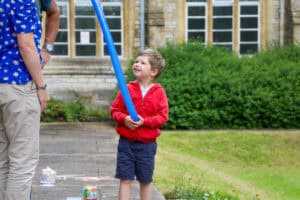
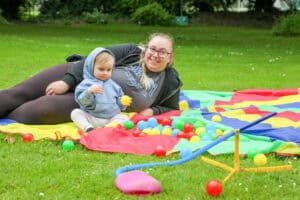
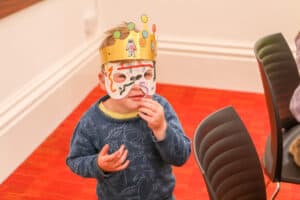
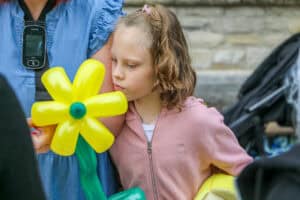
Practice Placements
Gain vital experience within a professional environment to support your learning
As part of our BA (Hons) Childhood with Therapeutic Play course, you will gain the opportunity to undertake practice placements.
These placements will allow you to work directly within local early years settings as you apply your theoretical learning within a real-world environment.
In both your first and second years, you will complete a practice placement, where the age group you work with will change depending on your chosen pathway.
In your second year, this practical element of the programme will include the delivery of therapeutic interventions.
Integrated Foundation Year Option
Build your academic knowledge, skills and confidence before your studies begin
This degree incorporates an additional foundation year to build knowledge and skills to support your academic development.
This option is primarily for students who have not yet met the academic entry requirements of the three-year degree, or feel that they need a little bit more preparation and experience to make the most of their studies.
After the foundation year, you will study modules delivered on the BA (Hons) Childhood with Therapeutic Play course.
This four-year route will help you gain a deeper understanding of this interesting subject and build your confidence and academic abilities.
This course offers
- An additional year to build academic skills.
- Lower entry requirements than the main degree pathway.
- More insight into education degree pathways and careers.
- Includes a school placement to give you a taster of a career in teaching.
Course costs and entry requirements
- 2022/23 UK fee: £9,250
- 2022/23 International fee: £14,500
- A minimum of 48 UCAS tariff points or equivalent.
- A GCSE C or 4 in English language is required
- Enhanced DBS check required
- If English is not your first language: IELTS 6.0 overall with a minimum of 5.5 in writing or equivalent
- Non-standard Application Entry Routes: The University has an alternative entry route for applicants who have relevant skills and experience but who do not hold the formal minimum entry qualifications required. Applicants who demonstrate the necessary skills and experience to enter a course of higher education will be asked to complete an entry task involving the completion of specially set assignments.
Study Abroad
Explore the opportunity to study part of your course abroad
As a student at the University of Chichester, you can explore opportunities to study abroad during your studies to enrich your educational experiences.
It’s a chance to broaden your horizons, a great opportunity to meet new people, undertake further travelling and to immerse yourself within a new culture.
You will be fully supported throughout the process to help find the right destination and institution for you and your course. We can take you through everything that you will need to consider, from visas to financial support, to ensure you get the best out of your time studying abroad.
Course Costs
Course Fees 2025/26
UK fee
International fee
EU/EEA Fee Reduction Scholarship
EU/EEA students automatically pay the equivalent of UK fees via the EU/EEA Fee Reduction Scholarship
For further details about fees, please see our Tuition Fees page.
For further details about international scholarships, please see our Scholarships page.
To find out about any additional costs on this course, please see our Additional Costs page.
Course specific costs
You will be required to have a satisfactory enhanced Disclosure Barring Service (DBS) check costing £40 which needs to be paid for before the start of the course.
Entry Requirements
Applying through Clearing
We know that you are so much more than your grades, which is why in Clearing we take your aspirations, passion and personality into account. Contact us to explore your options and learn more about how we can help you succeed.
UCAS
A Levels
BTEC
Cambridge Technical
CACHE Level 3 Diploma
T Level
Access to HE Diploma
IB
GCSE English Language
DBS
BA (Hons) Childhood with Therapeutic Play applicants are required to have an enhanced Disclosure Barring Service check which needs to be paid for before the start of the course.
We strongly suggest that all students sign up for the Disclosure and Barring Service update service for which there is a small annual charge, this makes the DBS portable both during and after the degree.
Failure to sign up for the update service might require the student to gain a further enhanced Disclosure and Barring Service check which will incur additional costs.
Contextual offers
We believe everyone deserves an equal opportunity to pursue higher education, regardless of their background.
When we receive your application we consider your personal circumstances and the factors surrounding your achievements to see if you are eligible for a contextual offer. This is an offer with a reduced entry tariff – typically the equivalent of 16 fewer UCAS points (two A-level grades).
Find out more about our contextual offers.
